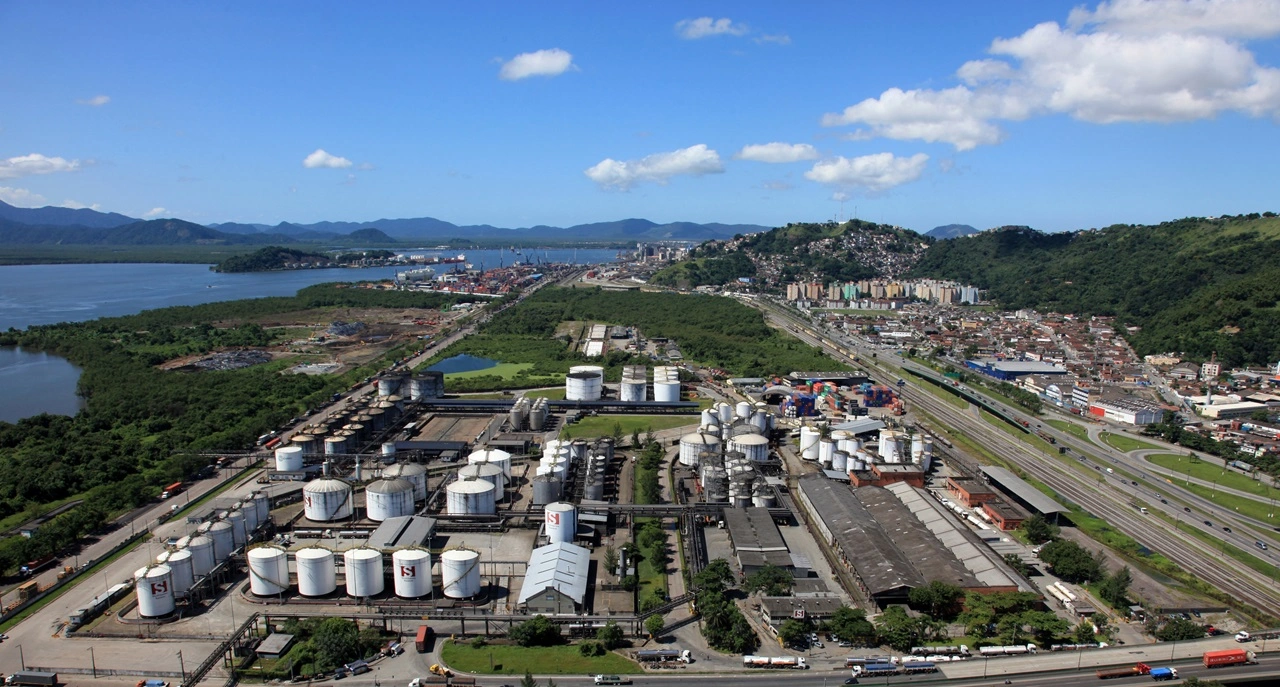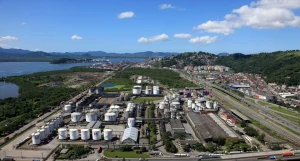Brazil’s Renewable Energy Push: Petrobras, Stolthaven, and Wilson Sons Lead the Charge
Aeriel view of Stolthaven Terminals in SantosPhoto: Stolthaven
Brazil is rapidly emerging as a global leader in renewable energy adoption, with major companies like Petrobras, Stolthaven Terminals, and Wilson Sons spearheading sustainable initiatives in the maritime and logistics sectors. From solar-powered terminals to green ammonia exports, Brazil is positioning itself as a hub for clean energy innovation.
Petrobras’ Transpetro to Power Terminals with Renewable Energy
Petrobras’ logistics subsidiary, Transpetro, is taking significant steps toward sustainability by exploring renewable energy projects for its 48 terminals across Brazil.
-
Solar Plant in Guarulhos: In April 2024, Transpetro inaugurated a solar plant in São Paulo state, capable of supplying 100% of the energy needed for its terminal at Guarulhos International Airport.
-
Expansion Plans: Marcio Guimaraes, Transpetro’s director of ducts and terminals, confirmed that the company is analyzing similar projects for all its terminals, aiming for full renewable energy integration.
This initiative aligns with Petrobras’ broader commitment to reducing carbon emissions and investing in clean energy.
Stolthaven and GES Secure Brazil’s First Green Ammonia Export Terminal
In a landmark move for Brazil’s green energy sector, Stolthaven Terminals and Global Energy Storage (GES) were awarded the rights to develop Brazil’s first green ammonia export terminal in Pecém.
Key Highlights:
-
Strategic Partnership: The terminal will support Brazil’s growing green hydrogen and ammonia industry, catering to global demand.
-
Decarbonizing Shipping: Green ammonia is a critical fuel for low-carbon shipping and power generation, aligning with EU targets of importing 10 million tonnes of renewable hydrogen by 2030.
-
Local Expertise: Stolthaven brings 42 years of experience in Brazil’s storage sector, ensuring efficient project execution.
Guy Bessant, President of Stolthaven Terminals, emphasized the terminal’s role in the energy transition, while Marcelo Schmitt, General Manager of Stolthaven Santos, highlighted Brazil’s potential as a renewable energy exporter.
Wilson Sons Advances Renewable Energy at Rio Grande Terminal
Brazilian shipping giant Wilson Sons is making strides in sustainability at its Rio Grande Container Terminal, with plans to transition entirely to renewable energy sources by 2025.
Key Developments:
-
IREC Certification: The terminal secured International Renewable Energy Certificates (IREC) for 2024-2026, ensuring zero carbon emissions from energy use.
-
Solar Power Plant: A new photovoltaic plant with 74 solar panels (545 Wp each) has been installed, along with EV charging stations.
-
Sustainability Goals: Monica Jaén, Sustainability Director, emphasized energy efficiency as a core strategy, aligning with global ESG standards.
Paulo Bertinetti, President of Rio Grande Terminal, stated that the facility will soon operate on 100% clean energy, reinforcing Brazil’s leadership in green port operations.
Why Brazil’s Renewable Energy Shift Matters
-
Global Energy Transition: Brazil is positioning itself as a key player in green hydrogen, ammonia, and solar energy exports.
-
Decarbonizing Logistics: Companies like Petrobras, Stolthaven, and Wilson Sons are setting benchmarks for sustainable maritime and terminal operations.
-
Economic Growth: Investments in renewables attract international partnerships, boosting Brazil’s economy while reducing reliance on fossil fuels.
Conclusion
Brazil’s energy sector is undergoing a green revolution, with major corporations investing heavily in renewable infrastructure. From Transpetro’s solar-powered terminals to Stolthaven’s green ammonia hub and Wilson Sons’ 100% renewable terminal, Brazil is paving the way for a sustainable future in global logistics.
Stay updated on Brazil’s renewable energy advancements by following industry news and key developments in green hydrogen, solar power, and sustainable shipping.


